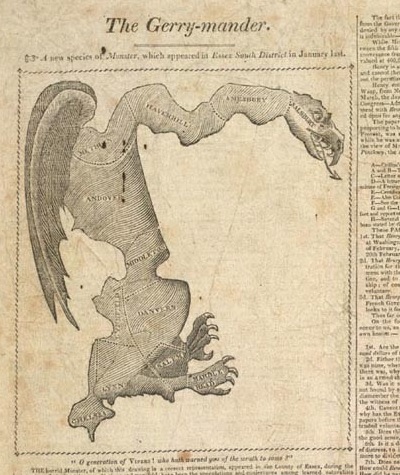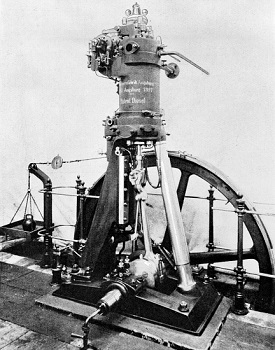The 5 Most Ridiculously Misunderstood Historical Legacies

If you're brilliant, industrious, and extremely lucky, you will leave your name in the annals of history. All you have to do is invent something lasting and iconic, and even if they don't realize they're doing it, people will speak your name every single day. Like the vaunted Baron Von Eggbeater, creator of -- you guessed it -- Von's grocery store. But be careful what kind of legacy you leave, or you'll be remembered forever for something you totally despise, as if you were granted a wish from one of those dickhead genies that have to twist everything around. Just look at ...
Andrew Jackson Hated Paper Currency, But His Face Was Put On A Banknote
The Face:
Anyone who's handled U.S. currency will recognize Andrew Jackson, whose harshly judgmental visage adorns all modern $20 bills. Having your face plastered on money is supposedly the greatest honor a politician can hope for. But don't tell Jackson that -- both because of what we're about to tell you, and also because he was generally an unpredictable maniac.
The Man:
Those who stayed awake in American history class will remember one of the largest issues surrounding Jackson's reelection in 1832: the Bank War. While the majority of the legislative branch wanted to reauthorize the charter of the Second Bank of the United States, Jackson fought the effort every step of the way. The bank was meant to regulate public credit created by private banking and maintain a stable national currency. But Jackson disagreed with federal banking on principle, arguing that it only benefited the rich. And what he hated most about it was the idea of money made out of paper instead of something innately valuable, like gold or silver.

That's a whole lot of words for what amounts to "I will stab and choke every asshole banker I see, so help me God."
Jackson lost his war against paper, but never stopped warning people about it. In his farewell address, he said, "But experience has now proved the mischiefs and dangers of a paper currency, and it rests with you to determine whether the proper remedy shall be applied."
Since the U.S. started getting way from the gold standard in 1933 -- eventually abandoning it entirely in 1971 -- it's safe to say that Jackson might be a bit miffed that his name and likeness are stamped onto over eight billion pieces of this "worthless" paper. And you don't want to make Jackson miffed. You wouldn't like Jackson when he's miffed.

We've already got him green. Don't push it.
Gerrymandering Was Named After Someone Who Opposed The Practice

The Word:
"Gerrymandering" is a shady little trick that state governments use when dividing up districts to ensure that one party wins most of the seats in the House, even if most of the voters belong to the other party. Here's a diagram:

It's like Tetris, except the more complicated the game gets, the fewer nonwhites get to play.
The term was invented by the editors of The Boston Gazette in 1812, in response to a new map of electoral districts in the state of Massachusetts, redrawn after the signing of a bill by the state's governor, Elbridge Gerry. The story goes that the artist, Gilbert Stuart, came into the editor's office one day and saw the map, grabbed his pencil, drew a head, claws, and wings on it, then said, "That will do for a salamander."

The rare winged, beaked, tailless, not-at-all-a-goddamn-salamander salamander.
The editor retorted, "Better say a gerrymander." Hyuck, hyuck!
Anyhoo, that's how American politics got power-fucked by a terrible pun.
The Man:
Elbridge Gerry was hesitant to sign the bill into law, specifically because he thought it was completely unfair. The guy responsible for designing lopsided district maps was Patrick Henry. You know, the "Give me liberty or give me death" guy. In the nation's first congressional election, Henry would also have rather gotten a nice gift of death than let James Madison win a seat in Congress. He specifically looked up past voting results and redrew district lines based on those votes, attempting to guarantee that the election would not go in Madison's favor.

"If you're all out of liberty, give me pettiness. I enjoy that, too."
Despite his reputation, Gerry hated "gerrymandering." In fact, he hated party politics in general, and as governor, he opened a meeting of both Massachusetts Houses of the Legislature by saying that the time had come to "terminate an unnatural, dangerous and disgraceful spirit of party" and "that we are all Republicans, that we are all Federalists."

But most importantly, you are all judged harshly by a severely disappointed Elbridge Gerry.
The Houses responded to his call for union by, at that very meeting, writing a redistricting bill drawing boundaries which would heavily favor the Democratic-Republicans. Gerry disclosed frequently to many fellow politicians and friends how "exceedingly disagreeable" this plan was. He considered sending the bill back to the Houses with his objections, but ultimately, his country was less than three decades old and he was terrified of setting a precedent which gave someone in his position such power over laws. Stuck between a rock and a hard place, he signed the bill.
The Boston Gazette honored his difficult decision by coining a term which forever associated his name with the shitty practice he hated. Despite Federalists winning almost 51 percent of the vote in subsequent elections, 29 of 40 Massachusetts Senate seats went to Democratic-Republicans. One of the only D-Rs to lose their seat in that election? Elbridge Gerry.
Draco's Laws Were Anything But Draconian
The Word:
"Draconian" is a term applied to harsh, unforgiving, and unjust punishment -- usually by the government. When the FBI starts using new digital means to invade your privacy and infringe on your liberties, or a software company makes you jump through hoops to get its newest version, or your dad makes you release all your favorite Pokemon because you forgot to feed your real dog, you use the word "draconian."

The Draconian Court of Areopagus: the Ancient Greek equivalent of parents who didn't fuckin' get it, man.
The Man:
Draco -- or Drako -- an Ancient Athenian, was the first legislator to establish a written law, and also a strong proponent of the public knowing the laws by which they'd be bound. Which seems like a gimme to us in modern times, but apparently history was a big fan of guesswork. In other words, Draco sought to prevent laws from being, well, draconian.
Before Draco, the ruling elite governed the masses any damn way they pleased. They used a system of oral law and blood feud which only they knew, so they were free to arbitrarily do whatever they wanted in the Grecian courts. Draco wrote down the previously established oral laws in order to give the oppressed more knowledge and security. Finally, the common people had a means by which to understand the limitations imposed upon them. He also wanted to stop punishments which exceeded the crime, and coined crime classifications. Draco took crimes like homicide and assigned different punishments based on circumstances, intent, or premeditation, instead of relying on how a judge felt about your shitty haircut or something.

"Our next case is against your barber."
Draco's intent was to prevent cruel and unusual punishment, and yet that's how we best remember him today. Tainting his legacy like that seems a little ... hmm ... if only there was a word for it ...
Epicurus Would Have Hated Today's Epicureans
The Word:
An epicure is a hedonistic gourmet who will spend their days browsing the finest grocery stores and farmer's markets. In the evening, they will wine and dine lavishly, entertaining company with only the most gourmet food and expensive wine. It's basically the antithesis of everything we are at Cracked.
The Man:
Epicurus was an Ancient Greek philosopher who had nothing to do with indulgence and luxury. In fact, the philosophy he developed teaches the exact opposite. He was kind of like the Ancient Greek equivalent of The Dude from The Big Lebowski.

"Yeah, well, you know, that's just, like, how the universe and the very nature of existence goes, man."
The confusion likely comes from the fact that Epicurus was technically a hedonist, but in this sense, that only means that he agreed with Aristotle that people tend to seek pleasure above everything else. It's easy to see how modern-day hedonists would take this as an excuse to party like it's 1999 B.C.
But Epicurus says that what you really want is "static" pleasure, meaning the mere absence of physical needs and anxiety. So in other words, as long as you're calm and fed, happiness is the natural state you're going to be in. For Epicurus, striving to fulfill non-necessary desires like power, money, glory, and yes, needlessly gourmet food and drink, would only lead to more anxiety. So best get rid of those false desires altogether.

He only looks like a grump because his dried beans and lake water were late that day.
Epicurus himself lived by this philosophy. He had a house with a nice garden outside of Athens, where anyone was invited to live a simple life with him discussing philosophy. He got by on a diet of bread and olives. If he saw your EPICURE vanity license plate on your brand-new Lexus parked at Whole Foods, he would vomit in rage. And it would smell of second-use olives, like Subway.
The Inventor Of The Diesel Engine Was A Tree-Hugging Socialist

The Word:
There's nothing in this world more closely associated with capitalism, meat-grinder warfare, and environmental pollution than the workhorse diesel engine. Though it's served many uses, from World-War-II-era Soviet tanks to the more recent VW emissions fiasco, a hell of a lot of bad has come from the engine which inventor Rudolf Diesel premiered at the 1900 World's Fair in Paris.

The second-worst thing done by a __dolf.
The Man:
Rudolf Diesel was an environmentalist and a socialist, and he actually wanted to reduce the world's dependency on fossil fuels. The diesel engine was originally designed to run on peanut oil. Some diesels can be converted to run on biofuel, but since most gargantuan pickup trucks aren't hauling ass down the interstate on the power of PBJs, you know Rudolf wouldn't be happy.

He wanted to save the planet, but only saved men the humiliation of having to admit their junk barely exists.
Diesel also hoped that his invention would foster social equality and peace between all nations. He was an outspoken and active egalitarian internationalist, who dreamed of a world society of equal individuals. He even published a book on the subject early on. So to him, one of the main benefits of his engine was that it enabled small-time craftsmen and artisans to compete with the industry behemoths that were beginning to snuff them out. The last thing he had in mind was that the engine should power submarines and other war contraptions, as it wound up doing a mere 15 years later. And that's why Rudolph Diesel is spinning in his grave right now -- though at significantly fewer RPMs than Nikolaus Otto.
The authors would like to thank Gregory Maus for the original idea and S. Peter Davis for contributing research. Quinn Knobbe is a child who never grew up. For more of his idiotic musings, follow his Facebook here. Wes Corwin is a stand-up comedian currently residing in Memphis. You can follow him on Twitter here, or listen to his jokes on the subjects of John Henry and Delivering Bad News here.
What's The Best Fictional School To Attend? In the muggle world, we're not given the opportunity for a magical hat to tell us which school we should go to. Usually we just have to go to the high school closest to where we live or whatever college accepts our SAT scores and personal essay. This month, our goal is to determine what would be the best fictional school to go to. Join Jack, Daniel, and the rest of the Cracked staff, along with comedians Brandie Posey and Steven Wilber, as they figure out if it's a realistic school like Degrassi or West Beverly High, or an institution from a fantasy world like Hogwarts with its ghosts and dementors, or Bayside High, haunted by a monster known only to humans as Screech. Get your tickets here!
For more people with unfortunate legacies, check out 6 Geniuses Who Saw Their Inventions Go Terribly Wrong and 6 Geniuses Who Saw Their Inventions Turn Evil.
Subscribe to our YouTube channel, and check out 11 Sex Toys Seemingly Designed To Ruin Sex, and other videos you won't see on the site!
Also, follow us on Facebook, and we'll follow you everywhere.



